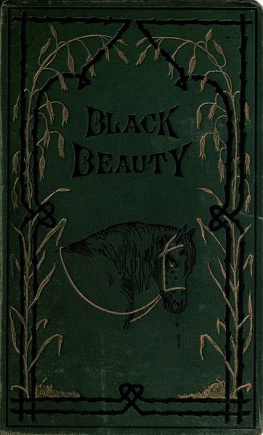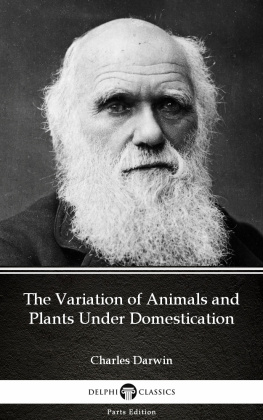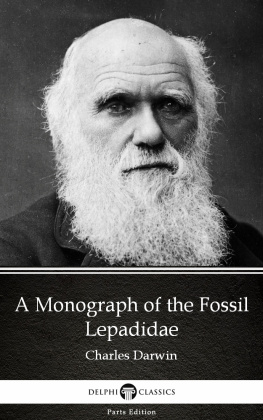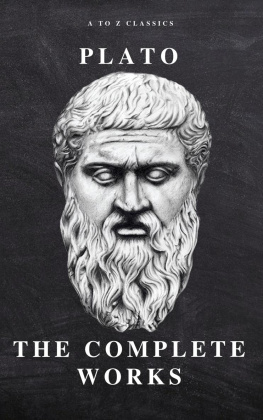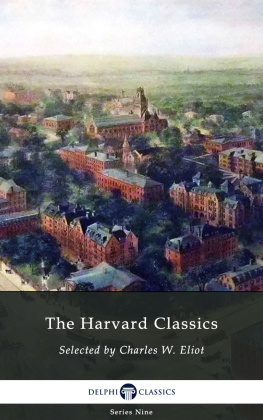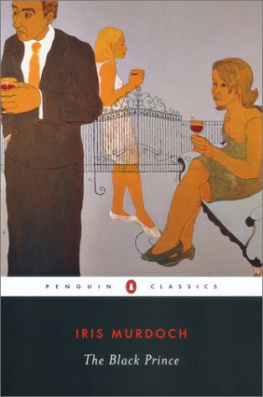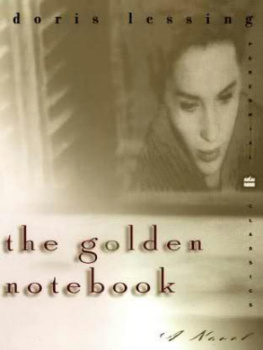Anna Sewell - Black Beauty (Unabridged Classics) (Sterling Classics)
Here you can read online Anna Sewell - Black Beauty (Unabridged Classics) (Sterling Classics) full text of the book (entire story) in english for free. Download pdf and epub, get meaning, cover and reviews about this ebook. year: 2004, publisher: Sterling, genre: Art. Description of the work, (preface) as well as reviews are available. Best literature library LitArk.com created for fans of good reading and offers a wide selection of genres:
Romance novel
Science fiction
Adventure
Detective
Science
History
Home and family
Prose
Art
Politics
Computer
Non-fiction
Religion
Business
Children
Humor
Choose a favorite category and find really read worthwhile books. Enjoy immersion in the world of imagination, feel the emotions of the characters or learn something new for yourself, make an fascinating discovery.
- Book:Black Beauty (Unabridged Classics) (Sterling Classics)
- Author:
- Publisher:Sterling
- Genre:
- Year:2004
- Rating:4 / 5
- Favourites:Add to favourites
- Your mark:
- 80
- 1
- 2
- 3
- 4
- 5
Black Beauty (Unabridged Classics) (Sterling Classics): summary, description and annotation
We offer to read an annotation, description, summary or preface (depends on what the author of the book "Black Beauty (Unabridged Classics) (Sterling Classics)" wrote himself). If you haven't found the necessary information about the book — write in the comments, we will try to find it.
Anna Sewell: author's other books
Who wrote Black Beauty (Unabridged Classics) (Sterling Classics)? Find out the surname, the name of the author of the book and a list of all author's works by series.
Black Beauty (Unabridged Classics) (Sterling Classics) — read online for free the complete book (whole text) full work
Below is the text of the book, divided by pages. System saving the place of the last page read, allows you to conveniently read the book "Black Beauty (Unabridged Classics) (Sterling Classics)" online for free, without having to search again every time where you left off. Put a bookmark, and you can go to the page where you finished reading at any time.
Font size:
Interval:
Bookmark:


Published: 1877
Type(s): Novels, Young Readers
Source: http://gutenberg.org
Anna Sewell (March 30, 1820 April 25, 1878) was a Britishwriter, the author of the classic novel Black Beauty. Anna was bornin Great Yarmouth, Norfolk, England, in a Quaker family, one of twochildren. Her brother, Philip (18221906) had an early career as aconstruction engineer in Europe, building railways. At the age of14, Anna fell while walking home from school in the rain, injuringboth her ankles. Possibly through mistreatment of her injury, shebecame lame for the rest of her life and was unable to stand orwalk for any length of time. For greater mobility, she frequentlyused horse-drawn carriages, which contributed to her love of horsesand concern for the humane treatment of animals. She never marriedor had children, but lived at home, and remained very close to hermother, Mary Wright Sewell. Mary was an author of evangelicalchildren's books, which Anna helped to edit. As Quakers, theSewells, and her mother's family, the Wrights, were active in goodworks. While seeking to improve her health at European spas, Sewellencountered various writers, artists, and philosophers, that herprevious background had not exposed her to. Sewell's onlypublication was Black Beauty, which she wrote between 1871 and1877. During this time her health was declining. She was often soweak that she couldn't get out of bed and writing at all was achallenge. She dictated the text to her mother and from 1876 beganto write on slips of paper which her mother then transcribed.Sewell sold the novel to the local publishers Jarrold & Sonsfor 40 on 24 November 1877, when she was 57. Although nowconsidered a children's classic, she originally wrote it for thosewho worked with horses. Anna said "its special aim being to inducekindness, sympathy, and an understanding treatment of horses" (MrsBayly, 272). The book's sales broke publishing records, it is saidto be "the sixth best seller in the English language" (Chitty inWells and Grimshaw, x). Sewell died of hepatitis or phthisis on 25April 1878 just five months after its publication; living longenough to see the book's initial early success. She was buried on30 April 1878 in the Quaker burial-ground at Lammas near Buxton,Norfolk, not far from Norwich, where a wall plaque now marks herresting place. Her birthplace in Church Plain, Great Yarmouth, isnow a museum. For ten years, she lived at Blue Lodge, Wick, nearBath and Bristol. The local estate of Tracy Park, now a golf club,was said to be the inspiration for Black Beauty's Birtwick Park.Blue Lodge is privately owned. The cottage where she lived, from1866 until her death, in Old Cattonthen a village but now a suburbof Norwichremains a private residence. Other Norwich attractionshave grown around the Sewell name including the Sewell BarnTheatre, a popular local theatre company which was part of theestate originally owned by Phillip Sewell. The small sized SewellPark opened on July 19, 1909, its unusual triangular shaped granitewater trough is used for a floral display and various members ofthe Sewell family are inscribed on it. On 11 October 2007 the housein Spixworth Road, Old Catton where Anna Sewell is said to havewritten the children's classic Black Beauty is up for sale with aprice tag of 625,000. Source: Wikipedia
http://www.feedbooks.com
Strictly for personal use, do not use this file for commercialpurposes.
To my dear and honored Mother,
whose life, no less than her pen,
has been devoted to the welfare of others,
this little book is affectionately dedicated.
The first place that I can well remember was a large pleasantmeadow with a pond of clear water in it. Some shady trees leanedover it, and rushes and water-lilies grew at the deep end. Over thehedge on one side we looked into a plowed field, and on the otherwe looked over a gate at our master's house, which stood by theroadside; at the top of the meadow was a grove of fir trees, and atthe bottom a running brook overhung by a steep bank.
While I was young I lived upon my mother's milk, as I could noteat grass. In the daytime I ran by her side, and at night I laydown close by her. When it was hot we used to stand by the pond inthe shade of the trees, and when it was cold we had a nice warmshed near the grove.
As soon as I was old enough to eat grass my mother used to goout to work in the daytime, and come back in the evening.
There were six young colts in the meadow besides me; they wereolder than I was; some were nearly as large as grown-up horses. Iused to run with them, and had great fun; we used to gallop alltogether round and round the field as hard as we could go.Sometimes we had rather rough play, for they would frequently biteand kick as well as gallop.
One day, when there was a good deal of kicking, my motherwhinnied to me to come to her, and then she said:
"I wish you to pay attention to what I am going to say to you.The colts who live here are very good colts, but they arecart-horse colts, and of course they have not learned manners. Youhave been well-bred and well-born; your father has a great name inthese parts, and your grandfather won the cup two years at theNewmarket races; your grandmother had the sweetest temper of anyhorse I ever knew, and I think you have never seen me kick or bite.I hope you will grow up gentle and good, and never learn bad ways;do your work with a good will, lift your feet up well when youtrot, and never bite or kick even in play."
I have never forgotten my mother's advice; I knew she was a wiseold horse, and our master thought a great deal of her. Her name wasDuchess, but he often called her Pet.
Our master was a good, kind man. He gave us good food, goodlodging, and kind words; he spoke as kindly to us as he did to hislittle children. We were all fond of him, and my mother loved himvery much. When she saw him at the gate she would neigh with joy,and trot up to him. He would pat and stroke her and say, "Well, oldPet, and how is your little Darkie?" I was a dull black, so hecalled me Darkie; then he would give me a piece of bread, which wasvery good, and sometimes he brought a carrot for my mother. All thehorses would come to him, but I think we were his favorites. Mymother always took him to the town on a market day in a lightgig.
There was a plowboy, Dick, who sometimes came into our field topluck blackberries from the hedge. When he had eaten all he wantedhe would have what he called fun with the colts, throwing stonesand sticks at them to make them gallop. We did not much mind him,for we could gallop off; but sometimes a stone would hit and hurtus.
One day he was at this game, and did not know that the masterwas in the next field; but he was there, watching what was goingon; over the hedge he jumped in a snap, and catching Dick by thearm, he gave him such a box on the ear as made him roar with thepain and surprise. As soon as we saw the master we trotted upnearer to see what went on.
"Bad boy!" he said, "bad boy! to chase the colts. This is notthe first time, nor the second, but it shall be the last.Theretake your money and go home; I shall not want you on my farmagain." So we never saw Dick any more. Old Daniel, the man wholooked after the horses, was just as gentle as our master, so wewere well off.
Font size:
Interval:
Bookmark:
Similar books «Black Beauty (Unabridged Classics) (Sterling Classics)»
Look at similar books to Black Beauty (Unabridged Classics) (Sterling Classics). We have selected literature similar in name and meaning in the hope of providing readers with more options to find new, interesting, not yet read works.
Discussion, reviews of the book Black Beauty (Unabridged Classics) (Sterling Classics) and just readers' own opinions. Leave your comments, write what you think about the work, its meaning or the main characters. Specify what exactly you liked and what you didn't like, and why you think so.

